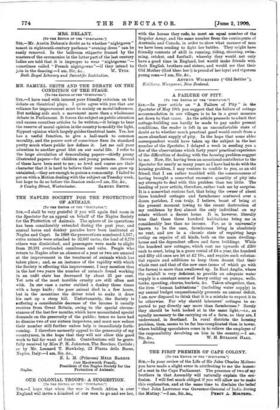A FAILURE OF PITY.
[To THE EDITOR OF THE "SPECTATOR."]
Sza,—In your article on "A Failure of Pity" in the Spectator of May 19th you suggest that the failure of cottage accommodation in our villages is to be in a great measure set down to that cause. As the article proceeds to admit that cottage-building can hardly be made to pay under present conditions, the reader is left in an uncomfortable state of doubt as to whether much practical good would result from a more abundant supply of pity. In the hope that some abler correspondent would have taken up the subject in the last number of the Spectator, I delayed a week in sending you a few of the observations which forty years' practical experience of the difficulties of dealing with the housing problem suggest to me. Now, Sir, having been an occasional contributor to the Spectator for nearly as many years as I have had to do with the housing problem, I may venture to confide to you, as an old friend, that I am rather troubled with the consciousness of having brought a somewhat excessive quantity of pity into my attempts to deal with this problem than too little. The heading of your article, therefore, rather took me by surprise. It is a somewhat curious fact, that being the owner of about three hundred cottages and farmhouses scattered over a dozen parishes, I can truly, I believe, boast of being at the present moment (owing to the recent destruction of my residence by fire) almost the only individual on my estate without a decent home. It is, however, literally true that these three hundred habitations bring me in considerably less than no income. For, as is universally known to be the case, farmhouses bring in absolutely no rent, and are in a chronic state of requiring large outlay on repairs of all kinds, both on the main dwelling- house and the dependent offices and farm buildings. While the hundred new cottages, which cost me upwards of 2200 each to erect, bring in a gross rental of 24 a year, the hundred and fifty old ones are let at 22 10s., and require such subatan- tial repairs and additions to keep them decent that their whole rent and that of the new ones (some of which go with the farms) is more than swallowed up. In East Anglia, where the rainfall is very deficient, to provide an adequate water supply is a constant source of heavy outlay on pumps, wells, tanks, spouting, churns, buckets, &c. Taken altogether, then, the item "human habitations" (including water supply) in my annual budget unquestionably presents an annual deficit. I am now disposed to think that it is a mistake to expect it to be otherwise. For why should labourers' cottages be ex- pected to pay directly any more than farmhouses ? Surely they should be both looked at in the same light,—i.e., as equally necessary to the carrying on of a farm, as they axe, I understand, in Scotland. In rural districts the housing problem, then, seems to be far less complicated than in towns, where building speculators come in to relieve the employer of the responsibility devolving on him in the country.—I am,


































 Previous page
Previous page